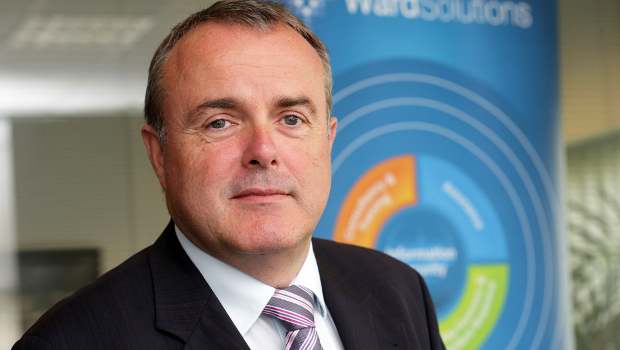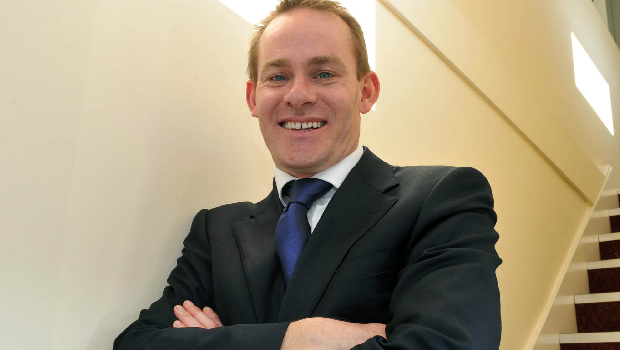Brexit will take at least two years to achieve but the uncertainty it has created has caused serious currency fluctuations which have hit Irish exporters badly. Even before it occurs, many analysts are downgrading the Irish economic outlook. How are Irish distributors and resellers, especially those with UK operations, faring in these turbulent conditions? What actions are they taking to mitigate the disruption? What do they think will happen in the long term?
Pat Larkin
CEO, Ward Solutions
Currency is one thing and the fluctuations are very significant, Larkin says, but there’s much more to Brexit than just currency. Ward Solutions has grown by 20% per annum in the Irish market for the last four to five years but from a strategic planning perspective, it had decided expanding into the UK was the natural next progression to continue that growth. It opened an office in Belfast two years ago as the first step.
The information security market in UK is much larger than in Ireland, making it a significant opportunity for Ward Solutions and “a key plank of our growth strategy”. Sterling’s woes are “already hurting and hitting” the company but in the medium and long term, the big issue is uncertainty over what emerges from Brexit. For instance, from a security perspective, what happens with general data protection rules. If the UK is not in the EU, then will Irish companies need to start treating it like North America when it comes to data protection and data transfer?
“[We will] probably have to park our growth plans for the UK, stay with our current strategy of operating in Northern Ireland and look for indigenous growth instead”
Part of the attraction of the UK to Irish companies like Ward Solutions is the access to a bigger talent pool of sales people, engineers and consultants, Larkin says. But if that talent is working on services and solutions across two islands and they don’t conform to current general data protection rules, then potentially Irish companies won be able to let UK staff access Irish customer data. Similarly, if the UK has a different data protection regime, it might not let Irish or European staff access personal data associated with UK citizens.
Stalled momentum
“The challenge for businesses like ourselves is we can’t afford to wait in terms of our growth plans,” Larkin remarks. “We have to put lot of plans on hold. We can’t make any firm decisions until the outcome is known over what shape Brexit will take for issues such as data protection, employee legislation and TUPE.”
He admits that Ward Solutions will “probably have to park our growth plans for the UK, stay with our current strategy of operating in Northern Ireland and look for indigenous growth instead”. While the company might have to postpone its plans for the UK, it “can’t shelve our growth plans”. But it’s difficult when Ward Solutions was lining up €2 million to €3 million of investments into the UK. And there would have been greater potential to achieve growth in the much larger UK market. Putting off investment into the UK also deprives Ward Solutions of the chance to diversify its markets which, in the event of a downturn in the Irish economy, might have helped to insulate it from the worst effects.
Larkin accepts that it suits the UK government politically to put Brexit “on the long finger” but for businesses planning in three year business plan cycles that can’t see any certainty coming out of the UK, it’s much more awkward. “The best case scenario is there’s a delay for two years [before Brexit happens], the worst case is it’s indefinite.”
So Ward Solutions is going to have to reassess its plans because it “can’t stand still or forego the investment we need to make”. Larkin says it’s “unfeasible” to transplant that investment into another market in Europe which it hasn’t researched to the same degree as the UK, so it will “have to look inwards”. But to try and achieve growth of the same order of magnitude as the UK is a challenge. “It will limit businesses like ourselves,” he concedes. “It sets the business back in real terms by three to four years.”
Justin Owens
Managing director, Commtech
The UK is a massive market, Owens says, and Brexit has made everything “look expensive over there. Staff are immediately 15% more expensive and you’ve only got the same purchasing power as yesterday”.
Commtech is predicting to do about 30% of its business in the UK in revenue terms this year and it has grown well there in the last few years. “There’s been an immediate effect with the change in sterling. It’s what affects us in the short term.”
Where distributors have to buy in local currency, the effects are being felt because vendors aren’t updating their exchange rates in real time. It used to be once a quarter and now has gone down to once a month, but if sterling drops in value by 5% overnight, it becomes 5% cheaper for UK distributors to sell into Ireland.
“We took a large hit to the top line in volume alone as we tried to discount to move stock and our margins were severely affected as well”
“We took a big hit there,” he admits. With commodity products, Commtech was suddenly 10% too expensive. “We were discounting to zero to keep customers,” Owens reveals. “We took a large hit to the top line in volume alone as we tried to discount to move stock and our margins were severely affected as well. It was tough because we weren’t hitting our targets through no fault of our own.”
With the margins in commodity products, it isn’t worth taking any of the measures to try and hedge currency on them.
Inflexible
He found vendors were “quite inflexible” because they didn’t update their exchange rates often enough. There was less problem with vendors that allow distributors to buy in dollars. Nevertheless, he believes it “will all wash through over time when the currency stabilises again, hopefully in the second half of the year”.
In the meantime, the uncertainty surrounding Brexit is not good for the UK economy. Large infrastructure spend could be put off or reduced, which is likely to affect Commtech which has an average sale price close of six figures in the UK. And any money Commtech does earn in the UK, will be 15% down when the distributor brings it back to Ireland from a reporting perspective. “Anybody getting paid in sterling is going to be down that amount of money,” he adds.
But Brexit hasn’t “strategically changed our outlook, even if there is a financial effect on our bottom line in the short to medium term”. There could be some positive effects on companies making strategic decisions to invest further in the UK or move to a different country, “hopefully Ireland”.
No one knows what will happen until Brexit occurs. What will happen with tariffs and VAT in the future? It all depends on what the final deal is. “I presume the EU won’t want to be seen as too soft, because if it’s too soft, it opens up the door for other people,” Owens observes. “I don’t think it will allow the UK to pick and mix.” But, at the same time, the UK is a significant market so while the EU won’t want to be soft, it will “still want to trade with the UK”.
Michael Conway
Director, Renaissance
Conway doesn’t beat around the bush, describing Brexit as “an own goal” and “an example of the failure of democracy”. Up to two weeks before the vote, he believed the UK would vote out, but as the deadline approached he expected a swing to staying in as people realised the implications.
“They’ve done a massive disservice to themselves,” he says. “I’m not sure that I’ve come across anybody in the UK who says they’re glad that they’re out and you almost get a sense that Europe is glad that they’re out.”
Conway accepts that the impact on the Irish market could be a challenge. “The biggest issue is the uncertainty. Brexit has plunged our nearest trading partner into an almost recession and it’s suffering a major interruption.”
He says that “the opportunities are hard to establish, but there must be opportunities”. In the meantime, trying to sell into the UK could be much more of a challenge for Irish companies because of sterling’s slide against the euro. Currency fluctuations are very difficult to correct in the short term. In addition, for Irish companies looking to expand into the UK, earning sterling is not going to be as attractive as it once was.
“[Brexit] could be the kick we needed to change our reliance on a comfortable traditional market”
There are also going to be more barriers in terms of trading to and fro between the UK and Ireland. Brexit could cause some grief for distributors and resellers with UK operations if they have different regulatory requirements and cross-border controls. He agrees with Larkin that data regulation could have a big effect. If data held in the UK comes to be treated as data outside the EU, there will be serious implications for cloud-based solutions. At the moment, a Spanish company with a UK subsidiary can replicate data between the two locations but that might not be possible after Brexit. Similarly, a US company wanting to hold data in the EU might not be able to site it in UK data centres.
Satellite markets
It may well cause some US vendors to change their perspective on the UK as the central hub for their European operations which, Conway believes, would be “a massive hit”. At the same time, their perspective of Ireland as a satellite of the UK market may need to change to treat it as an EU satellite instead.
He agrees with Larkin that “uncertainty is the main thing. Nobody likes uncertainty, it’s impossible to plan. People hold off. That will have an impact on the Irish economic outlook and the Irish economy to some degree”. It’s true that Ireland is a massive exporter to the UK but the UK is also a massive exporter to Ireland. Brexit could be a kick to the Irish market “but it could be the kick we needed to change our reliance on a comfortable traditional market”.
Also, Brexit will leave Ireland as the only English-speaking EU member other than Malta, which should increase its attractiveness to US vendors. The overall effect on Ireland “might not be massively better or worse, but it’s going to be different”.
As for the UK, he quotes the adage “if you’re not at the table, you’re on the menu”, adding that “to end up with everything it wants, the UK could end up with everything it didn’t want”.
Michael O’Hara
Managing director, DataSolutions
O’Hara accepts that Irish exporters to the UK have been hit badly by Brexit, “but the IT sector has not been as badly affected as other sectors”. The value of the euro has increased by 13% since the Brexit vote which is “a significant increase for any Irish business to absorb and remain competitive against its UK counterparts”.
But the worst affected sector is agri-food where the base costs of the products sold are nearly 100% incurred in euros so the currency fluctuations hit hard. This is typically not the case with IT. The majority of IT vendors are US businesses that transact internationally in dollars and the dollar has strengthened against sterling and the euro. “For both UK and Irish distributors and resellers the cost of US priced products has increased by 14% in the last two months and there is no price advantage for UK-based distributors and resellers over the Irish players,” he argues.
But the uncertainty created by Brexit “is slowing down the decision making and buying cycle as caution kicks in”. O’Hara does not believe the IT market in the UK will be badly affected this year because budget was allocated to most 2016 projects before the Brexit vote, but he warns: “I suspect it will start to kick in in 2017 when new budgets are agreed.”
“In the long term, Irish distributors and resellers operating in UK market will prosper”
The uncertainty could lead to a slowdown in the UK economy and in IT spend but “this depends on how the EU and UK (in particular) respond and what actions they take resulting from the Brexit vote over the coming months”. If the UK government can reassure businesses that Brexit is good for the UK economy and if it brings in incentives to stimulate business and the economy, “this might ease nerves”.
Meanwhile, in the short term, distributors and resellers “are repricing any opportunities they are working on and trying to remain as competitive as possible”.
Longer term, O’Hara is more upbeat. “I am confident the tumult surrounding Brexit will settle down,” he says. “The UK will untangle itself from the EU, a process which will take a number of years, and over this time the UK government will bring in changes in tax law and trading terms to stimulate the UK economy and return it to a growing economy again. In the long term, Irish distributors and resellers operating in UK market will prosper.”













Subscribers 0
Fans 0
Followers 0
Followers